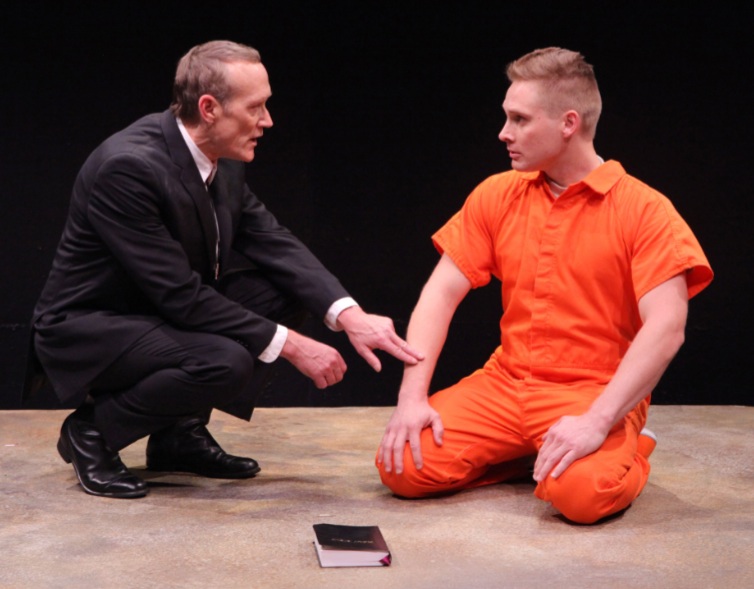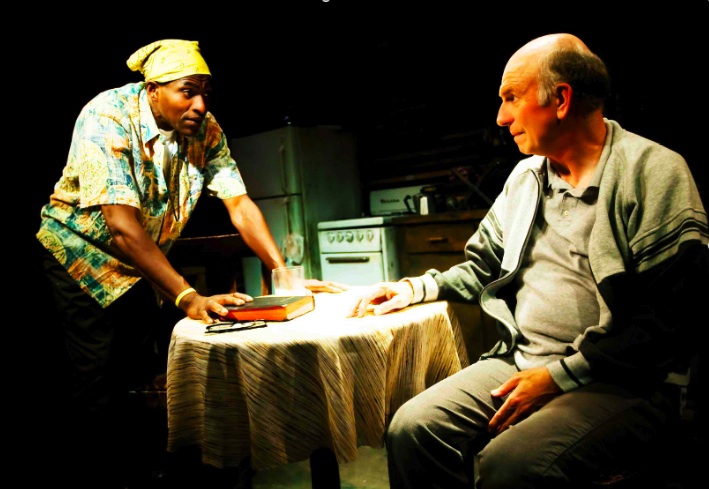
I was going to save my continuing exploration of the term "political play" for Berkeley Rep's upcoming (and highly anticipated) The Great Game: Afghanistan, a three-part "sweeping cycle of 12 short plays" covering the history of our bruised war-time bedfellow, which opens later this month. But then I saw two shows that started spinning my definition in advance.
A political play. A play with political aspirations, about current events, speaking truth-to-power? A play of activism, of community engagement? A play of argument, dialogue, rhetorical defeat? The canon of political theatre is deep and varied, but the two plays I saw that got me thinking about politics were strikingly similar and small:
Marin Theatre Company's brave, sophisticated yet brutal, syncopated broken mirror of a modern warrior's drama, 9 Circles by Bill Cain (closing Nov 7th). And SF Playhouse's soft, stirring "novel in play form" The Sunset Limited by the Pulitzer-winning author Cormac McCarthy (closing Nov 6th).
9 Circles (directed by Kent Nicholson) is a soldier's descent from the mysterious hell of an unforgiving life, through an unforgiving war, into the edge of an unforgiving eternity. The Sunset Limited is a conversation between a faithful man and the skeptic that he "saved" from suicide. Both are philosophical plays as well as plays of personal and global violence. Both are character dramas offering meaty roles for impressive (almost all-male) ensembles. Both are small cast shows (three and two actors, respectively) that put huge questions in the audience's laps. And both handle the simple horrors and simpler pleasures of human existence with a poet's clarity and a scholar's measure.

James Carpenter and Craig Marker in the premiere of 9 Circles. Photo by Ed Smith
Cain's play is the most obvious candidate for a political play moniker. A modern-day soldier is accused of a horrible crime during his time in Iraq. The very meaning and effect of war, of justice, of law (moral and federal) is challenged by the simplest shock: a man that does not feel. The 9 circles (a reference to Dante's nine circles of hell in his Inferno) become the structure of the play, a bad man's ever worsening bad dream. It reminds us of our complicity in the idea of war, of this war (of which similar wars have been going on for hundreds of years). In the end, the play forces us (as well as its characters) to a critical question: what kind of violence do we accept, and by accepting some violence do we weaken our moral stance as a whole? When we train people to kill, or bully them to a point of hopelessness, or discourage them from getting help, how much can we actually blame them? Do we blame their chain of command? Do we blame ourselves as citizens of a fighting nation?
Cain's is a play that brings government, law, psychology, religion, morality, war, and one man's awful deeds into the same spiral of moral reckoning. And its funny. Because its true.
McCarthy's play directed by Bill English (previously produced at Steppenwolf Theater in 2006) is a reckoning of faith, meaning, the point of life, and the ancient realization that humanity is rife with horror, and what kind of god what let that be the case. And it is funny. Because its true.

Carl Lumbly and Charles Dean in The Sunset Limited. Photo by Jessica Palopoli
The Sunset Limited is a conversation between two men, one white and one black, in a bleak house in a bad neighborhood, moments after the white "professor" just tried to commit suicide by leaping in front of a commuter train. It is very literally nothing more than that. Two people on the verge of it all, talking about the point of it all. This becomes a thoughtful, conversational battle of secular and faithful, of how much God should get into government, of who has the right to tell anyone else how to live (or die), of how much you are responsible for your fellow person. And if that's not the truest kind of American political philosophy you know, I don't know what to tell you. That is old time civics and old time religion. Though some of accused it of being more of a novel, this play is a play albeit the simplest kind. It is a simple situation, in which two very different people with very different ideas talk like their life depended on it. Because in this play it does. When one man leaves the room the play is over, but boy do those questions remain.
Both plays are charming, soulful, and a tangle of humanity on trial. Both are intermissionless, fast, funny, dark and humble plays of rhetoric slamming up against reality.
To me, political plays are plays of perspective. Plays that make us see an idea a new way, or give words to an old argument, or challenge our moral codes by giving it a human heart, or just show us a kind of person (a killer, a savior?) you've never met before. The category of political plays is deep with activism, but these are plays of ache. The bruises are old. As the soldier in 9 Circles says:
"The battle of Lepanto was in 1571. Yet I fought in it."
Talk about epic meeting everyday. The plays made me think and kept me thinking.
I did not expect these two productions similarly resonant, so urgent and eternal, so spiced with the violence and curiosity of our current American Experience. They are reckonings. Because they're true.
Now if I can get as much female perspective...